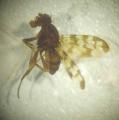Diptera.info :: Identification queries :: Diptera (adults)
|
Tachinidae?
|
|
| Roden |
Posted on 11-06-2017 17:35
|
|
Member Location: Chile Posts: 66 Joined: 19.10.06 |
Tachinidae, I think. Not more than 5 mm. Atacama Desert, Chile. |
|
|
|
| John Carr |
Posted on 11-06-2017 18:56
|
|
Super Administrator Location: Colorado, USA Posts: 10595 Joined: 22.10.10 |
Probably an undescribed species of Paradidyma (tribe Minthoini). It doesn't match any of the species in the revision by Reinhard (1934), but he may not have included all species described by Townsend in other genera. Reinhard, H. J. 1934. American muscoid flies of the genera Ceratomyiella and Paradidyma. Proceedings of the United States National Museum 83 [= No. 2973]: 9–43. |
| Zeegers |
Posted on 11-06-2017 19:48
|
|
Member Location: Soest, NL Posts: 19271 Joined: 21.07.04 |
Nice to see the vitta-feature implying Minthoini works in Chile as well. Beware, though, that it is not always correct ! (cf. my Minthosoma from Yemen). Theo |
|
|
|
| John Carr |
Posted on 11-06-2017 20:13
|
|
Super Administrator Location: Colorado, USA Posts: 10595 Joined: 22.10.10 |
Some species are not so distinctively striped, but the common species are. Other characters present in many but not all species are closed cell r5 and modified female fore tarsi. The strong parafacial bristles distinguish Paradidyma from the other North American genus of Minthoini, Vanderwulpia. |
| Zeegers |
Posted on 11-06-2017 20:31
|
|
Member Location: Soest, NL Posts: 19271 Joined: 21.07.04 |
Indeed, it is a oneway implication 'striped --> possible Minthoini', and definitely not vice versa ! |
|
|
|
| ChrisR |
Posted on 12-06-2017 07:04
|
|
Super Administrator Location: Reading, England Posts: 7706 Joined: 12.07.04 |
Fascinating fly ... my first thought was "Minthoini" but then no lateral compression of the abdomen and that steeply angled median vein ... interesting 
Manager of the UK Species Inventory in the Angela Marmont Centre for UK Biodiversity at the Natural History Museum, London. |
| Roden |
Posted on 13-06-2017 06:07
|
|
Member Location: Chile Posts: 66 Joined: 19.10.06 |
Thanks for the ID. Very interesting comments. |
|
|
|
| John Carr |
Posted on 07-12-2024 19:13
|
|
Super Administrator Location: Colorado, USA Posts: 10595 Joined: 22.10.10 |
I checked the catalog of Tachinidae of Chile published in 2021 and there are no records of Minthoini from the country. This could be Ateloglutus (Proteloglutus) chilensis (Brèthes, 1920) in tribe Voriini. Some of the members of Voriini and Minthoini resemble each other, although they are in different subfamilies. See González CR (1989) El genero Ateloglutus Aldrich, 1934 con una nueva especie para la Republica Argentina (Diptera: Tachinidae: Voriini). Acta Entomológica Chilena 15: 225–228. http://revistas.u.../view/2293 |
| Zeegers |
Posted on 08-12-2024 22:27
|
|
Member Location: Soest, NL Posts: 19271 Joined: 21.07.04 |
If this is a Voriini .... you have very weird Voriini ! Theo |
|
|
|
| John Carr |
Posted on 09-12-2024 05:58
|
|
Super Administrator Location: Colorado, USA Posts: 10595 Joined: 22.10.10 |
I found the description of the species I mentioned and I don't think it's the fly in the picture. I'm back to Minthoini. Not Paradidyma any more. It has two widely spaced intra-alars while this fly has the hind two of a normal set of three. Probably one of the three genera of South American Minthoini, and not a species recorded from Chile. I don't have enough literature to say more. In America Minthoini and the Wagneria group have been confused. Both groups tend to have a row of strong parafacial bristles, a similar arrangement of scutellar bristles, and closed cell r5. |
| Jump to Forum: |













